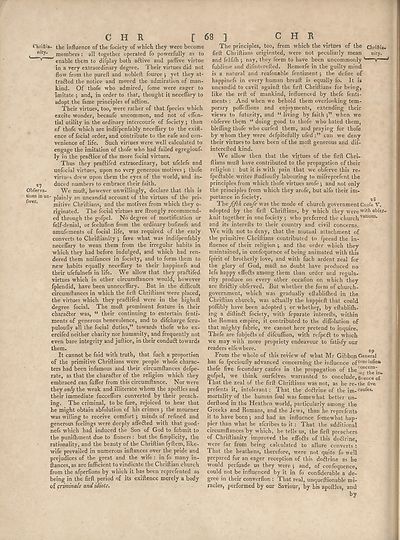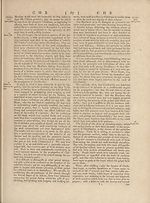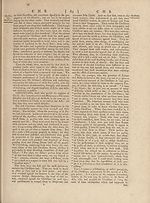Encyclopaedia Britannica, or, a Dictionary of arts, sciences, and miscellaneous literature : enlarged and improved. Illustrated with nearly six hundred engravings > Volume 6, CHI-Crystallization
(76) Page 68
Download files
Complete book:
Individual page:
Thumbnail gallery: Grid view | List view

C H R [ 68 ] C H R
Chriftia- the influence of the fociety of which they were become
t nity* members: all together operated fo powerfully as to
_ v enable them to difplay both aftive and paffive virtue
in a very extraordinary degree. Their virtues did not
flow from the pureft and nobleft fource $ yet they at-
trafled the notice and moved the admiration of man¬
kind. Of thofe who admired, feme were eager to
imitate j and, in order to that, thought it neceflary to
adopt the fame principles of adtion.
Their virtues, too, were rather of that fpecies which
excite wonder, becaufe uncommon, and not of effen-
tial utility in the ordinary intercourfe of fociety ; than
of thofe which are indifpenfably neceflary to the exift-
ence of focial order, and contribute to the eafe and con¬
venience of life. Such virtues were well calculated to
engage the imitation of thofe who had failed egregiouf-
ly in the practice of the more focial virtues.
Thus they praftifed extraordinary, but ufelefs and
unfucial virtues, upon no very generous motives j thofe
virtues drew upon them the eyes of the world, and in-
27 duced numbers to embrace their faith.
Obferva- We muft, however unwillingly, declare that this is
tions in an- p]ainJy an uncandid account of the virtues of the pri¬
mitive Chriftians, and the motives from which they o-
riginated. The focial virtues are ftrongly recommend¬
ed through the gofpel. No degree of mortification or
felf-denial, or feclufion from the ordinary bufinefs and
amufements of focial life, was required of the early
converts to Chriftianity ; fave what was indifpenfably
neceflary to wean them from the irregular habits in
which they had before indulged, and which had ren¬
dered them nuifances in fociety, and to form them to
new habits equally neceflary to their happinefs and
their ufefulnefs in life. We allow that they praftifed
virtues which in other circumftances would, however
fplendid, have been unneceflary. But in the difficult
circumftances in which the firft Chriftians were placed,
the virtues which they pradifed were in the higheft
degree focial. The moft prominent feature in their
charafter was, “ their continuing to entertain fenti-
ments of generous benevolence, and to difeharge feru-
puloufly all the focial duties,” towards thofe who ex-
ercifed neither charity nor humanity, and frequently not
even bare integrity and juftice, in their conduct towards
them.
It cannot be faid with truth, that fuch a proportion
of the primitive Chriftians were people whofe charac¬
ters had been infamous and their circumftances defpe-
rate, as that the chara&er of the religion which they
embraced can fuffier from this circumftance. Nor were
they only the weak and illiterate whom the apoftles and
their immediate fuccefibrs converted by their preach¬
ing. The criminal, to be fure, rejoiced to hear that
he might obtain abfolution of his crimes 5 the mourner
was willing to receive comfort ; minds of refined and
generous feelings were deeply affe6ted with that good'
nefs which had induced the Son of God to fubmit to
the puniftiment due to finners: but the fimplicity, the
rationality, and the beauty of the Chriftian fyftem, like-
wife prevailed in numerous inftances over the pride and
prejudices of the great and the wife : in fo many in¬
ftances, as are fufficient to vindicate the Chriftian church
from the afperfions by which it has been reprefented as
being in the firft period of its exiftcnce merely a body
of criminals and idiots*
The principles, too, from which the virtues of the chrifHa.
firft Chriftians originated, were not peculiarly mean nity.
and felfiih j nay, they feem to have been uncommonly v—->/——■
fublime and difinterefted. Remorfe in the guilty mind
is a natural and reafonable fentiment ; the defire of
happinefs in every human breaft is equally fo. It is
uncandid to cavil againft the firft Chriftians for being,
like the reft of mankind, influenced by thefe fenti-
ments : And when we behold them overlooking tem¬
porary poffeflions and enjoyments, extending their
views to futurity, and “ living by faith j” when we
obferve them “ doing good to thofe who hated them,
blefling thofe who curfed them, and praying for thofe
by whom they were defpitefully ufed can we deny
their virtues to have been of the moft generous and dif¬
interefted kind.
We allow then that the virtues of the firft Chri¬
ftians muft have contributed to the propagation of their
religion : but it is with pain that we obferve this re-
fpeftable writer ftudioufly labouring to mifreprefent the
principles from which thofe virtues arofe ; and not only
the principles from which they arofe, but alfo their im¬
portance in fociety. 2g
The Jifth caufe was the mode of church government Caufe V.
adopted by the firft Chriftians, by which they were witfi okto-
knit together in one fociety j who preferred the churchYatl0ns*
and its interefts to their country and civil concerns.
We wifh not to deny, that the mutual attachment of
the primitive Chriftians contributed to fpread the in¬
fluence of their religion \ and the order which they
maintained, in confequence of being animated with this
fpirit of brotherly love, and with fuch ardent zeal for
the glory of God, muft no doubt have produced no
lefs happy effe&s among them than order and regula¬
rity produce on every other occafion on which they
are ftricily obferved. But whether the form of church-
government, which was gradually eftabliftied in the
Chriftian church, was actually the happieft that could
poflibly have been adopted ; or whether, by eftablifh-
ing a diftindt fociety, with feparate interefts, within
the Roman empire, it contributed to the diflfolution of
that mighty fabric, we cannot here pretend to inquire.
Thefe are fubjedls of difeuflion, with refpedl to which
we may with more propriety endeavour to fatisfy our
readers elfewhere.
From the whole of this review of what Mr Gibbon General
has fo fpecioufly advanced concerning the influence ofconcJufioB
thefe five fecondary caufes in the propagation of '“nctehr"jn
gofpel, we think ourfelves warranted to conclude,fl^ence oT
That the zeal of the firft Chriftians was not, as he re-the five
prefents it, intolerant: That the dodlrine of the im-caufes*
mortality of the human foul was fomewhat better un¬
derflood in the Heathen world, particularly among the
Greeks and Romans, and the jews, than he reprefents
it to have been; and had an influence fomewhat hap¬
pier than what he aferibes to it : That the additional
circumftances by which, he. tells us, the firft preachers
of Chriftianity improved the eflfedls of this dotfrine,
were far from being calculated to allure converts :
That the heathens, therefore, were not quite fo well
prepared for an eager reception of this do&rine as he
would perfuade us they were ; and, of confequence,
could not be influenced by it in fo confiderable a de¬
gree in their converfion : That real, unqueftionable mi¬
racles, performed by our Saviour, by his apoftles, and
by
Chriftia- the influence of the fociety of which they were become
t nity* members: all together operated fo powerfully as to
_ v enable them to difplay both aftive and paffive virtue
in a very extraordinary degree. Their virtues did not
flow from the pureft and nobleft fource $ yet they at-
trafled the notice and moved the admiration of man¬
kind. Of thofe who admired, feme were eager to
imitate j and, in order to that, thought it neceflary to
adopt the fame principles of adtion.
Their virtues, too, were rather of that fpecies which
excite wonder, becaufe uncommon, and not of effen-
tial utility in the ordinary intercourfe of fociety ; than
of thofe which are indifpenfably neceflary to the exift-
ence of focial order, and contribute to the eafe and con¬
venience of life. Such virtues were well calculated to
engage the imitation of thofe who had failed egregiouf-
ly in the practice of the more focial virtues.
Thus they praftifed extraordinary, but ufelefs and
unfucial virtues, upon no very generous motives j thofe
virtues drew upon them the eyes of the world, and in-
27 duced numbers to embrace their faith.
Obferva- We muft, however unwillingly, declare that this is
tions in an- p]ainJy an uncandid account of the virtues of the pri¬
mitive Chriftians, and the motives from which they o-
riginated. The focial virtues are ftrongly recommend¬
ed through the gofpel. No degree of mortification or
felf-denial, or feclufion from the ordinary bufinefs and
amufements of focial life, was required of the early
converts to Chriftianity ; fave what was indifpenfably
neceflary to wean them from the irregular habits in
which they had before indulged, and which had ren¬
dered them nuifances in fociety, and to form them to
new habits equally neceflary to their happinefs and
their ufefulnefs in life. We allow that they praftifed
virtues which in other circumftances would, however
fplendid, have been unneceflary. But in the difficult
circumftances in which the firft Chriftians were placed,
the virtues which they pradifed were in the higheft
degree focial. The moft prominent feature in their
charafter was, “ their continuing to entertain fenti-
ments of generous benevolence, and to difeharge feru-
puloufly all the focial duties,” towards thofe who ex-
ercifed neither charity nor humanity, and frequently not
even bare integrity and juftice, in their conduct towards
them.
It cannot be faid with truth, that fuch a proportion
of the primitive Chriftians were people whofe charac¬
ters had been infamous and their circumftances defpe-
rate, as that the chara&er of the religion which they
embraced can fuffier from this circumftance. Nor were
they only the weak and illiterate whom the apoftles and
their immediate fuccefibrs converted by their preach¬
ing. The criminal, to be fure, rejoiced to hear that
he might obtain abfolution of his crimes 5 the mourner
was willing to receive comfort ; minds of refined and
generous feelings were deeply affe6ted with that good'
nefs which had induced the Son of God to fubmit to
the puniftiment due to finners: but the fimplicity, the
rationality, and the beauty of the Chriftian fyftem, like-
wife prevailed in numerous inftances over the pride and
prejudices of the great and the wife : in fo many in¬
ftances, as are fufficient to vindicate the Chriftian church
from the afperfions by which it has been reprefented as
being in the firft period of its exiftcnce merely a body
of criminals and idiots*
The principles, too, from which the virtues of the chrifHa.
firft Chriftians originated, were not peculiarly mean nity.
and felfiih j nay, they feem to have been uncommonly v—->/——■
fublime and difinterefted. Remorfe in the guilty mind
is a natural and reafonable fentiment ; the defire of
happinefs in every human breaft is equally fo. It is
uncandid to cavil againft the firft Chriftians for being,
like the reft of mankind, influenced by thefe fenti-
ments : And when we behold them overlooking tem¬
porary poffeflions and enjoyments, extending their
views to futurity, and “ living by faith j” when we
obferve them “ doing good to thofe who hated them,
blefling thofe who curfed them, and praying for thofe
by whom they were defpitefully ufed can we deny
their virtues to have been of the moft generous and dif¬
interefted kind.
We allow then that the virtues of the firft Chri¬
ftians muft have contributed to the propagation of their
religion : but it is with pain that we obferve this re-
fpeftable writer ftudioufly labouring to mifreprefent the
principles from which thofe virtues arofe ; and not only
the principles from which they arofe, but alfo their im¬
portance in fociety. 2g
The Jifth caufe was the mode of church government Caufe V.
adopted by the firft Chriftians, by which they were witfi okto-
knit together in one fociety j who preferred the churchYatl0ns*
and its interefts to their country and civil concerns.
We wifh not to deny, that the mutual attachment of
the primitive Chriftians contributed to fpread the in¬
fluence of their religion \ and the order which they
maintained, in confequence of being animated with this
fpirit of brotherly love, and with fuch ardent zeal for
the glory of God, muft no doubt have produced no
lefs happy effe&s among them than order and regula¬
rity produce on every other occafion on which they
are ftricily obferved. But whether the form of church-
government, which was gradually eftabliftied in the
Chriftian church, was actually the happieft that could
poflibly have been adopted ; or whether, by eftablifh-
ing a diftindt fociety, with feparate interefts, within
the Roman empire, it contributed to the diflfolution of
that mighty fabric, we cannot here pretend to inquire.
Thefe are fubjedls of difeuflion, with refpedl to which
we may with more propriety endeavour to fatisfy our
readers elfewhere.
From the whole of this review of what Mr Gibbon General
has fo fpecioufly advanced concerning the influence ofconcJufioB
thefe five fecondary caufes in the propagation of '“nctehr"jn
gofpel, we think ourfelves warranted to conclude,fl^ence oT
That the zeal of the firft Chriftians was not, as he re-the five
prefents it, intolerant: That the dodlrine of the im-caufes*
mortality of the human foul was fomewhat better un¬
derflood in the Heathen world, particularly among the
Greeks and Romans, and the jews, than he reprefents
it to have been; and had an influence fomewhat hap¬
pier than what he aferibes to it : That the additional
circumftances by which, he. tells us, the firft preachers
of Chriftianity improved the eflfedls of this dotfrine,
were far from being calculated to allure converts :
That the heathens, therefore, were not quite fo well
prepared for an eager reception of this do&rine as he
would perfuade us they were ; and, of confequence,
could not be influenced by it in fo confiderable a de¬
gree in their converfion : That real, unqueftionable mi¬
racles, performed by our Saviour, by his apoftles, and
by
Set display mode to:
![]() Universal Viewer |
Universal Viewer | ![]() Mirador |
Large image | Transcription
Mirador |
Large image | Transcription
Images and transcriptions on this page, including medium image downloads, may be used under the Creative Commons Attribution 4.0 International Licence unless otherwise stated. ![]()
| Permanent URL | https://digital.nls.uk/193008411 |
|---|
| Attribution and copyright: |
|
|---|
| Description | Ten editions of 'Encyclopaedia Britannica', issued from 1768-1903, in 231 volumes. Originally issued in 100 weekly parts (3 volumes) between 1768 and 1771 by publishers: Colin Macfarquhar and Andrew Bell (Edinburgh); editor: William Smellie: engraver: Andrew Bell. Expanded editions in the 19th century featured more volumes and contributions from leading experts in their fields. Managed and published in Edinburgh up to the 9th edition (25 volumes, from 1875-1889); the 10th edition (1902-1903) re-issued the 9th edition, with 11 supplementary volumes. |
|---|---|
| Additional NLS resources: |
|

